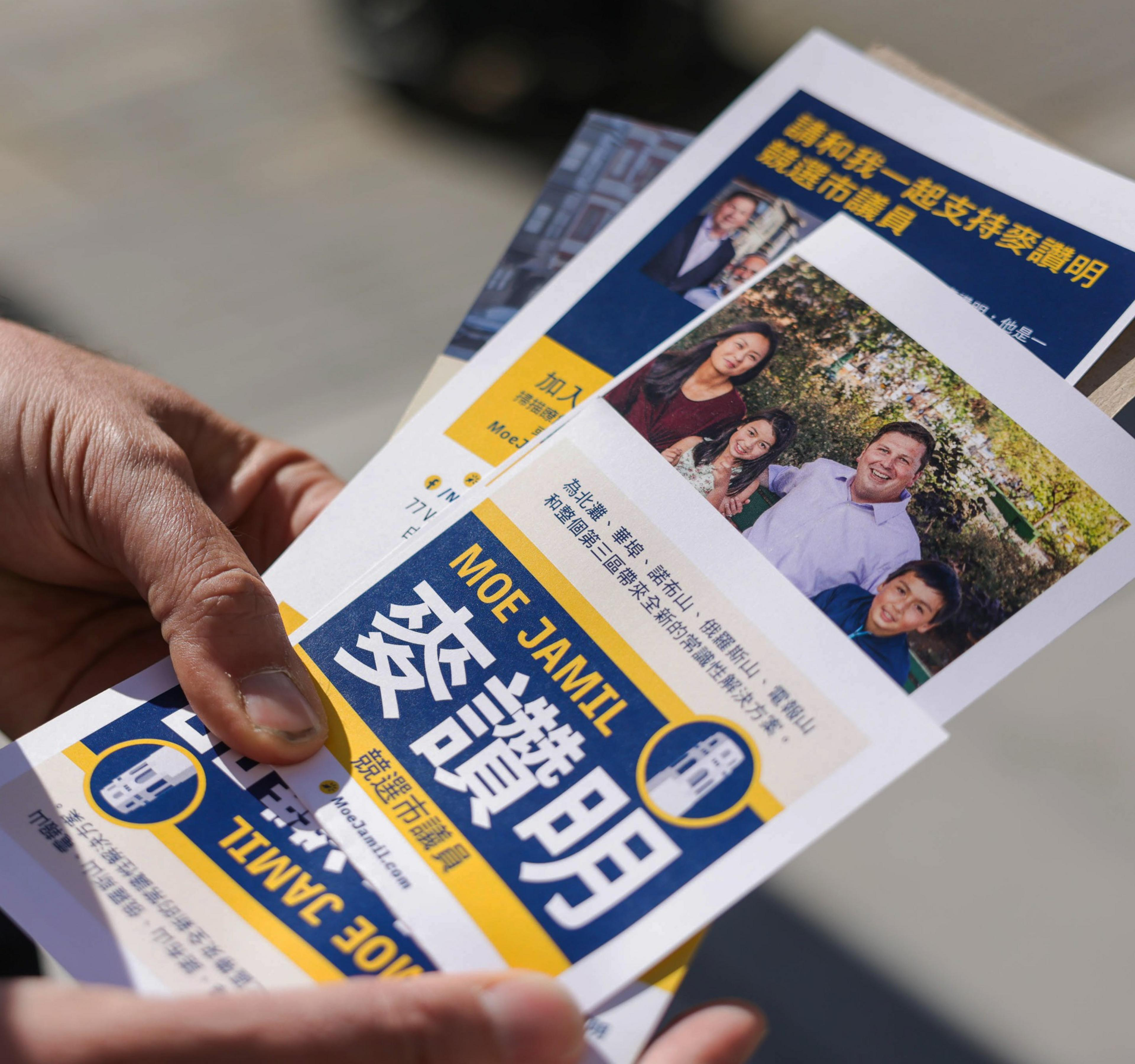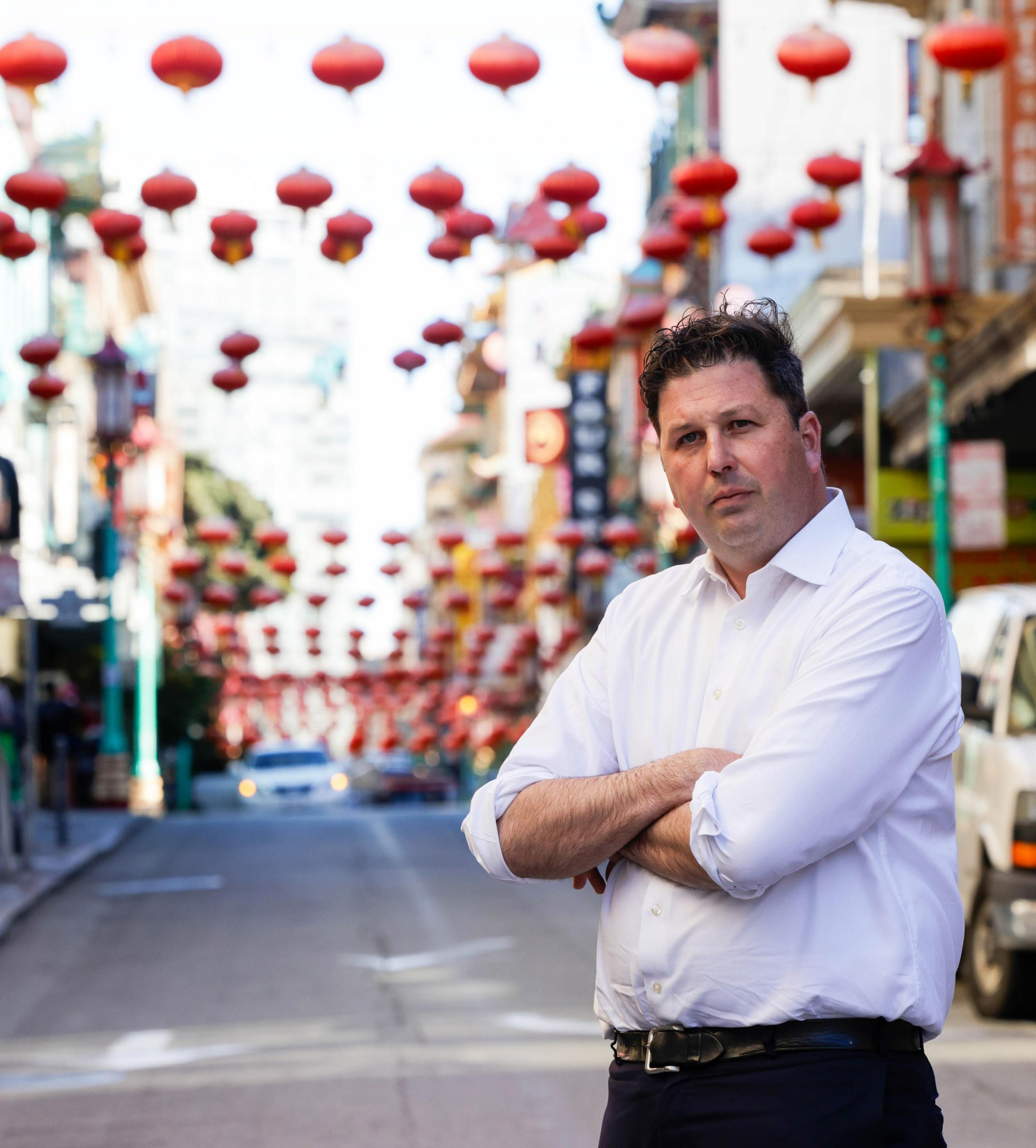In 1997, Moe Jamil traveled to Hong Kong and spent a year there studying Cantonese, a language widely spoken in San Francisco’s large Chinese immigrant community. After he returned to the U.S., he kept practicing and achieved conversational-level fluency.
Years later, Jamil is running for office in San Francisco—specifically, to represent Chinatown on the Board of Supervisors. He knew his language skills would be a huge advantage in his campaign, allowing him to engage directly with Cantonese-speaking voters in the neighborhood.
Unexpectedly, he’s now facing an identity crisis of sorts. Thanks to new rules enacted by the Department of Elections, Jamil isn’t sure how to introduce himself in Chinese. He’s been using “麥讚明 (mak zaan ming),” a name close to his English name pronunciation, for months. But it’s possible that the department will reject his name and give him a new one, forcing him to change his Chinese moniker and print new signs midway through his campaign.
“My Chinese name has been in Chinese newspapers four times already,” Jamil said. “Changing my Chinese name will create a disadvantage for me to communicate with Chinese voters.”


The issue dates back to late last year, when San Francisco decided to implement a 2019 state law that requires candidates to prove that they’ve used their self-submitted Chinese names for two years or were given the names when they were born. If they can’t, they will be given a transliteration-based name for the ballot.
Critics say the new rules naturally favor incumbents with established Chinese names as they have held offices for over two years and hurt political newcomers’ chances of winning.
The change has a special significance in San Francisco. For decades, politicians have maintained a tradition of seeking “authentic” two- or three-character Chinese names from their Chinese friends or political consultants rather than long, awkward transliteration-based names assigned by the elections department. It was a free-for-all with few restrictions as candidates adopted names with positive connotations in the Chinese community.
But the new rules sparked a political crisis: Some Chinese Americans couldn’t find documentation of their names for the March election, and many non-Asian candidates who had just acquired Chinese names were given new, transliteration-based names.
With the November election approaching fast, current candidates for mayor and supervisor have sent letters to the Department of Elections demanding an immediate decision on their Chinese names. But they were asked to wait.
“The Department of Elections says they won’t even review [my Chinese name] until July,” Jamil said. “This is unacceptable.”
‘A matter of urgency’
Because of the new law, Daniel Lurie, a first-time candidate for mayor, was forced to abandon his first three-character Chinese name and adopt a five-character transliteration-based name earlier this year.
When he announced his campaign last year, Lurie named himself 羅瑞德, which means “auspicious” (瑞) and “virtue” (德). But because he couldn’t prove he’s been using it for two years, that name doesn’t qualify. Knowing he would likely be assigned a longer transliterated name, he changed his name to 丹尼爾·羅偉 (dan-nee-er luo-wei).
The name change damaged his name recognition, obviously. He has appeared in Chinese-language media for months with the old name, and the campaign had to redesign and print all its materials and notify Chinese-language media that he’d be using the second name. However, the department may still reject his second name and give him a third one.

The potential problem with Lurie’s second name lies in the last two characters, “羅偉” (luo-wei), which might differ from the transliteration used by the Department of Elections. Their rendition could be “路里” (lu li) or “露瑞” (lu ray), both of which phonetically resemble “Lurie” more closely.
In a letter to the Department of Elections, Lurie’s attorney blasted the current practice and said it unfairly forces candidates to guess Chinese names that might ultimately be rejected. A campaign spokesperson called it an example of “how a corrupt bureaucracy serves City Hall insiders instead of the public interest.”
Jamil’s attorney also wrote in a letter to the Department of Elections protesting its handling of the Chinese names.
“It is a matter of urgency that the department signs off on his name so that Mr. Jamil can immediately begin to finalize, print and publish all of his campaign materials,” the letter stated. “Absent that, he cannot communicate effectively with a large group of voters critical to his campaign.”
The Department of Elections didn’t respond to a request for comment.
Jamil, a deputy city attorney who took a leave of absence to campaign full-time, explained that he did have a Chinese name back in Hong Kong decades ago but that name was never used in the public sphere. His current name sounds similar to his English name.
The advantage of an established Chinese identity is obvious. Candidates with official Chinese names are referenced accordingly in Chinese media, while those without established names can be referenced differently in Chinese outlets that use different transliterations.
“A great name ID always helps your campaign,” said David Ho, a political consultant, “especially in this year’s race. Everyone is trying to get Chinese votes.”

Matt Boschetto, a candidate for District 7 supervisor who uses the Chinese name 步向陽 (bow hoeng yeung), which means “walking toward the sun,” also hired an attorney to send a letter to the department. He argued the current practice would benefit the incumbents and contradict laws intended to ensure that all candidates for office are treated fairly.
The department told the candidates the decision will come after the nomination period, in June or July, according to the emails reviewed by The Standard. Candidates will lose “months of precious campaign time” as they wait for the official ruling on their names, according to Jamil.
John Arntz, director of the elections department, said in a statement last year that the department will “adopt a policy that sets a reasonable standard” to regulate the Chinese name usage. After months of drafting, the legislation to codify the new rules under the state law (opens in new tab) is now pending at the Board of Supervisors.
It is likely to pass, but it will take months and the supervisors may bring in amendments that could substantially change the practice.
Jen Nossokoff, who’s running for District 1 supervisor, has been speaking up against the new practice since last year. She said she’s appalled by the abrupt change during a presidential election year and that the city should take more time before implementing new rules.
For now, she says she’ll continue to use her current name, whether the city approves of it or not.
“I’m still proudly using my gifted name, 高素贞 (gao su zhen),” she said. “It is neither fiscally nor operationally feasible for me to change my Chinese name in the middle of my campaign.”
